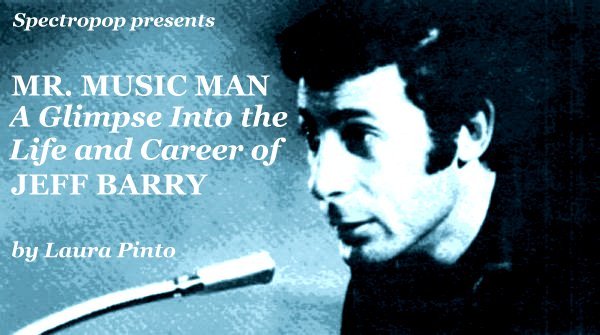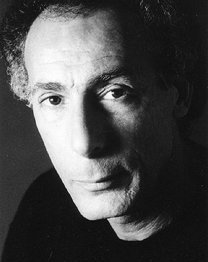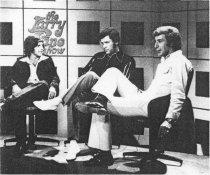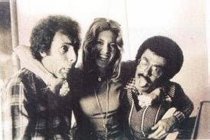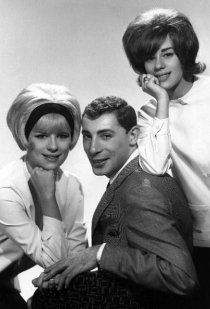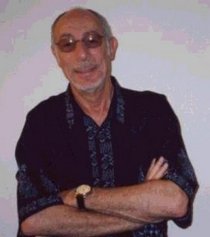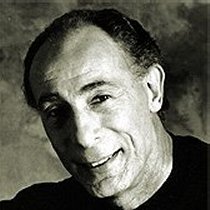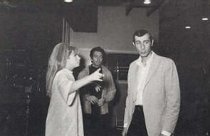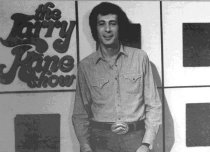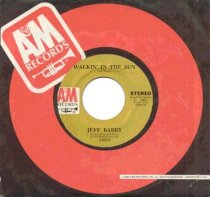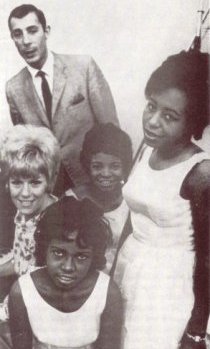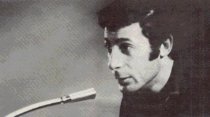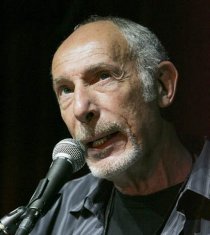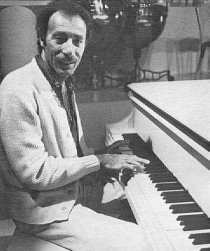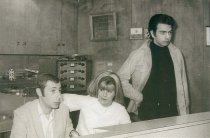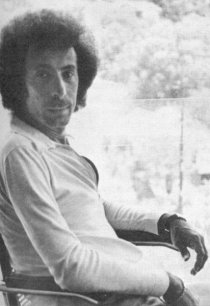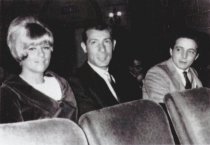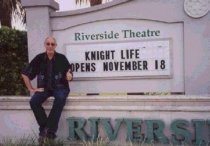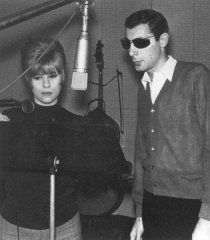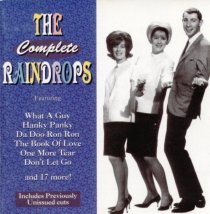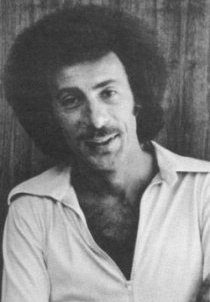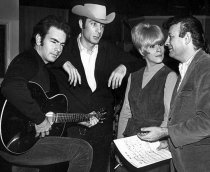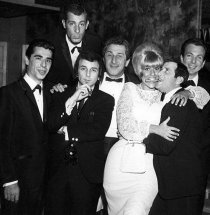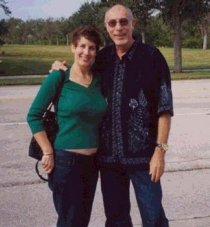|
Born Joel Adelberg in Brooklyn, New York on 3 April 1938,
the boy who would become Jeff Barry had an early affinity
for music. When he was six or seven, his mother wrote down
a song he'd made up. It went something like this: "I
got a gun, I got a saddle, I got a pony too / I've even got
a sweetheart, that sweetheart is you." Gun? Saddle? Pony?
Yep, the boy not only loved music but also girls and cowboys,
though not necessarily in that order. He had a cowboy hat,
outfit, pistols, probably even boots, but was forced to pass
on the saddle or pony; no stables existed at the Circle A
Ranch.

Jeff's childhood was unspectacular; he wasn't a rebel, he
wasn't a child prodigy (his fondness for cowboy songs notwithstanding),
and he certainly wasn't a blueblood. His family was working
class Jewish, fairly common for the times and the neighborhood.
There was a Depression going on at the time of Jeff's birth,
and the start of World War II was just around the corner.
Jeff's father, an insurance salesman, was blind, his sister
mentally retarded. When Jeff was seven years old, his parents
divorced, and his mother moved him and his sister to Plainfield,
New Jersey, where they resided for several years before returning
to New York. Living conditions were less than optimal. That
formative period in Jeff's life brought him a rather unpalatable
taste of poverty and helped shape him into the man he would
grow into - smart as a whip, talented, and successful on every
scale, along with a somewhat melancholic side which, despite
being tempered with a keen wit, a generous and fun-loving
nature and a wicked sense of humor, would never leave him.

By the time he was in his teens, Jeff, who in his words had
"always loved to perform/show off," was singing
with a group of friends at school, and he continued singing,
this time onstage at various functions, while in the U.S.
Army Reserves after graduation. He was stationed at Fort Knox
- a somewhat prophetic circumstance, considering that, within
a few short years, everything he touched would turn to gold.
After his commission ended, he enrolled at New York City College
to study design engineering, but music had become his passion
by this time and he was cutting more classes than he attended
in order to sing and perform. The moment of truth came when
a professor at the college gently suggested to Jeff that he
should find a way to make music his livelihood, because he
was a lot better at it than he was at engineering. Probably
this was not strictly true; Jeff has a brilliant mind and
is a natural-born inventor, and he most likely would have
been able to succeed at anything he put his hand to. But it
was fair to say that he was, well, distracted - and, besides,
he was offered an alternative that was just too good to turn
down. "I didn't leave college to pursue a singing career,"
Jeff explains, "so much as to take the offer of $75 per
week to write songs - big money in 1959!"

It was quite common during the late Fifties in New York to
know somebody who knew somebody in the music business. For
Jeff, the first somebody was his cousin, who introduced Jeff
to the second somebody, a publisher named Arnold Shaw. It
was the late Fifties, and Jeff was out of his teens and ripe
for a place in show business - as a singer. But because his
keyboard skills were rudimentary and he was unable to play
other people's songs, Jeff auditioned for Shaw with his own
compositions. Shaw was more impressed with Jeff's songs than
with his singing (odd, since Jeff has a wonderful voice and
a fantastic range) and signed him as a staff writer for E.B.
Marks. Through Shaw, Jeff also obtained a recording contract
with RCA Records, with legendary songwriter/producers Hugo
(Peretti) and Luigi (Creatore) at the production helm. During
the next few years, Jeff paired up with other writers such
as Beverly Ross, Ben Raleigh and Artie Resnick to compose
songs for other people to record, and he cut a few sides himself,
like his first release for RCA, "It's Called Rock And
Roll" b/w "Hip Couple" (both compositions are
credited to his birth name, but the single itself was released
under his new professional nom de plume). In 1960, Jeff realized
his first pop hit with "Tell Laura I Love Her",
written with Raleigh, recorded by Ray Peterson (#7 U.S.) and
subsequently covered by Ricky Valance, who took it all the
way to #1 in the UK. Although he had no way of knowing just
yet how his career would take off like a rocket - "Can't
say I can [predict] the future, 'specially back then when
the future was next week" - Jeff was beyond pleased with
the turn of events: "It sure was exciting, thrilling
and unbelievable!"

In October of 1962, Jeff wed Ellie Greenwich, herself a songwriter
who was signed with Jerry Leiber and Mike Stoller's Trio Music.
Jeff was signed to Trio as well and the newly married couple
was given their own office in which to crank out tunes. Ellie
introduced Jeff to her newest writing partner, Phil Spector,
and the rest, as they say, is musical history. During 1963,
the Barry-Greenwich-Spector team defined the Girl Group sound,
with tunes like "Be My Baby" and "Baby, I Love
You" (The Ronettes), "Then He Kissed Me" and
"Da Doo Ron Ron" (The Crystals), "Not Too Young
To Get Married" (Bob B. Soxx and The Blue Jeans) and
"(Christmas) Baby Please Come Home" by Darlene Love.
Jeff and Ellie even formed their own group, of sorts; one
day the couple recorded a demo of a song they'd written on
a train on their way into the city that very morning, with
Ellie singing lead and all the female parts, Jeff providing
doo-wop style background vocals in a bass voice, and the only
instrumentation Ellie's keyboards and Jeff's drum kit. The
song (and demo) was intended for a group called The Sensations.
Instead, Leiber and Stoller sold "What A Guy" to
the Jubilee Records label and the demo was released as a single
under the name The Raindrops (chosen as a tribute to the then-popular
Dee Clark song); it just missed the national Top Forty, peaking
at #41. An eponymous LP was subsequently recorded, and a touring
group was sent out to lip-sync the songs at various venues;
surprisingly, Jeff, whose original goal had been to perform,
turned down the chance to go with them. "Maybe it was
[because] I wanted to sing LEAD!" Jeff quips, tongue
not so firmly in cheek. The Raindrops hit the U.S. Top Twenty
with "The Kind Of Boy You Can't Forget", but a single
about another boy, "That Boy John", swiftly fell
from grace after U.S. President John F. Kennedy was assassinated
in Dallas, Texas in November of '63. A 16-year-old from Ohio,
however, recorded his own version of the B side with altered
lyrics; after a lengthy and convoluted journey to the national
airwaves, Tommy James and The Shondells hit #1 on the Billboard
charts with "Hanky Panky" in mid-1966. The Raindrops
had also had high hopes for "Do Wah Diddy" (which
was recorded by The Exciters as well) but were blindsided
by Manfred Mann's release of the tune with an extra "Diddy"
thrown into the title for good measure; its success spelled
the end of The Raindrops' recording career. But the couple's
biggest triumphs as songwriters/producers had only just begun.

When Jerry Leiber, Mike Stoller, and George Goldner formed
Red Bird Records in 1964, Jeff and Ellie were brought in to
the venture as well. For the whole of that year, the pair
could do no wrong; fifteen of Red Bird's first twenty releases
made the national charts, and all of these had the distinction
of having been written and/or produced by the Barry-Greenwich
team. The Dixie Cups' "Chapel Of Love", a tune written
with Phil Spector and previously recorded (but not released)
by both The Ronettes and Darlene Love, knocked The Beatles'
"Love Me Do" out of the US #1 spot in the spring
of '64. Later that year, The Shangri-Las' first Red Bird offering,
"Remember (Walkin' in the Sand)", co-produced by
Jeff with composer George "Shadow" Morton, peaked
at #5, and the following month, the teen-tragedy drama "Leader
Of The Pack", written by Barry-Greenwich-Morton, roared
its way to the top of the charts. (Yes, Virginia, that is
a real motorcycle heard on the track; Jeff remembers running
a mike cord down the studio stairs and out to the street to
record the revving vroom-vrooms from the Harley owned by engineer
Joe Veneri.)

"Leader" was enough of a smash (no pun intended)
to warrant a parody record; in late 1964, while the original
was still on the charts, a group called The Detergents, comprised
of session singers Ronnie Dante, Danny Jordan and Tommy Wynn,
debuted on the American pop scene with "Leader Of The
Laundromat". Members of the record-buying public were
amused, but the original song's composers weren't and filed
a lawsuit, which was eventually settled out of court. In an
odd twist of fate, a member of the clean-up group would later
join forces with one of those composers for what would turn
out to be another chapter in the musical history books. Ron
Dante, who'd been a staff writer for Don Kirshner's Aldon
Music prior to becoming a Detergent, was aware of Jeff's reputation
as a hitmaker well before he knew Jeff personally. One day,
he saw Jeff for the first time outside Mirasound Studios and
was quite impressed by the six-foot-four-inch urban cowboy:
"He was wearing leather and a cowboy hat [and] riding
a huge motorcycle," Ron relates. "'WOW, what a cool
guy,' I thought. The year I got into the music business, he
and Ellie won 14 top awards at the BMI dinner for all the
hits they wrote that year. Since he was one of the most honored
writers in the [industry], I wanted to work with him."
Ron would realize his goal within a couple of years: "I
[was] booked on some background dates for Jeff but never spent
any time with him." At least, he hadn't yet; that opportunity
was soon to come. Knowing that Jeff didn't just pick anybody
off the street with whom to make records, however, Ron must
have taken pride in being tapped to do session work for him.

Jeff had learned quite early on in the music business that,
if you want a record to be the best that it can be, you surround
yourself in the studio with talented people. He also learned
that the learning never stops; proficient musicians become
that way in part because they pick up tricks and techniques
from each other. One such talented musician was arranger Artie
Butler, who has fond memories of those days in the studio
with Jeff. "[Jeff and I] worked together in my early
days in the music business in New York in the Brill Building
- the Red Bird/Leiber & Stoller days to be exact. I learned
sooooooo much about making records from him," Artie enthuses.
"He taught me how to throw away the rules at times, and
go for the basic feel in a recording session. It's a lesson
I am forever grateful to him for. Even today I find I still
apply some of what he instinctively taught me." Sal DiTroia,
a gifted guitarist whose artistry can be heard on a number
of Jeff's recordings such as "Remember" and "Leader
Of The Pack", agrees: "Artie [is] right. Jeff Barry
did not follow the rules. He was so far ahead of his time.
His energy in the studio was contagious. He had so much enthusiasm
for his projects. I always looked forward to what I would
learn and be able to take with me. He used to call me 'Sal
the Hook.' I would come up with hooks on my guitar that people
could identify with. One example is the guitar fill in 'I'm
A Believer'. I thoroughly enjoyed his sessions. I miss that
enthusiasm."

Jeff's enthusiasm was no doubt given an extra boost by his
innate adaptability; it was perhaps inevitable that the former
engineering student brought his skills as an inventor into
the studio with him. Anything that could produce a sound was
fair game. Whether it was a traditional instrument played
in a non-traditional way (pounding on a drum with a mallet),
or a non-instrument pressed into service for a given session
(pounding on a plastic garbage can with a mallet), Jeff's
expertise as a producer-arranger was limited only by his imagination,
which meant that it was virtually limitless. On The Dixie
Cups' "Iko Iko", for example, ashtrays and glass
pop bottles were tapped with pencils and drumsticks for percussion,
and a curio that Jeff and Ellie had purchased in Jamaica while
on their honeymoon served as a bass. The possibilities were
endless, infinite, and Jeff's brilliant mind teemed with them.
He and Ellie continued to write songs for artists not on the
Red Bird roster; the couple penned "Maybe I Know"
and "Look Of Love" for Lesley Gore, as well as "Don't
Ever Leave Me" for Connie Francis, on which Jeff plays
drums. Jeff also recorded a single, "I'll Still Love
You" b/w "Our Love Can Still Be Saved", for
Red Bird - two tracks that showcase his chameleon voice, which
could easily shift gears to suit the material. "I'll
Still Love You" was well on its way to becoming an R&B
hit until it was discovered that Jeff was white, a fact that
wasn't obvious from his lead vocal.

Red Bird Records would survive for only a couple more years
before being dissolved (as, ultimately, was Jeff and Ellie's
marriage), but Jeff's career had hit its stride and was unstoppable.
During 1966, Barry and Greenwich produced a young singer-songwriter
for whom Ellie had been hired to sing a demo; his name was
Neil Diamond. Ellie loved the songs he wrote, Jeff loved his
vocal style, and the three of them, Diamond, Barry and Greenwich,
joined together to form the publishing company Tallyrand Music.
Neil was signed to the Bang label and enjoyed a string of
hits including "Girl, You'll Be A Woman Soon", "Solitary
Man" and "Kentucky Woman". Jeff and Ellie can
be heard singing background vocals on many of the tracks,
like "Cherry, Cherry", Neil's first release for
Bang, which peaked at #6 on the national charts - his highest
placement for the label. Jeff and Ellie also reunited with
Phil Spector to write "River Deep - Mountain High",
which Spector produced for Ike and Tina Turner, and "I
Can Hear Music", recorded by The Ronettes (with Jeff
producing) and, later, by The Beach Boys, who charted in the
Top Forty with the tune in 1969.

When Jeff was brought in by music supervisor Don Kirshner
to oversee sessions for The Monkees in 1966, he wasted no
time in living up to his sterling reputation: The group's
recording of Neil Diamond's "I'm A Believer", produced
by Jeff, shot to the #1 position, became Record of the Year,
and to this day remains one of the biggest-selling (and most
played) singles of all time. A subsequent Diamond-penned,
Barry-produced release, "A Little Bit Me, A Little Bit
You", would peak at #2. And in April of 1967, while he
was still working with Neil Diamond and The Monkees, Jeff
founded Steed Records and entered into an agreement granting
Dot Records the distribution rights for the new label, for
which Jeff would be the exclusive producer. The acts that
Jeff was already producing would remain with their own record
companies, but all up-and-coming talent would be signed to
the Steed roster - a roster that would eventually include
such diverse acts as The Illusion, Robin McNamara and the
undisputed star of the label, Montreal native Andy Kim. That
same year, Jeff was asked to provide the music for a forthcoming
Broadway play, The Freaking Out of Stephanie Blake,
which was to star 1940's actress Jean Arthur. Ron Dante was
thrilled when Jeff stopped him outside the Brill Building
and asked him if he would like to be in the musical. "I
could not believe my luck," Ron says. "The rehearsals
were great. I [played] the lead in a hippie rock group on
stage and got to sing a few Jeff Barry songs. During that
time Jeff and I worked beautifully together. He was a great
music man. Always full of energy and easy to work with."
Unfortunately, the star lost her voice during previews, and
the show never made it to opening night. (A few years later,
Jeff would write the music for another play, The Dirtiest
Show in Town, and produce it for Off-Broadway; Ron was
not a cast member of that particular musical.)

In 1968, Steed went from a canter to a gallop as Jeff began
producing its newest artist, Andy Kim, who also became Jeff's
primary writing partner during the three years they worked
together. Andy had a string of hits on the Steed label, most
notably "How'd We Ever Get This Way", "So Good
Together" and remakes of The Ronettes' "Be My Baby"
and "Baby, I Love You". Jeff breathed new life into
these two "baby" songs with fresh and fantastic
arrangements, such as a heavy percussive sound he effected
in the latter by playing one component of the drum kit at
a time (to prevent sound leakage), layering each one on the
track like the petals of a flower. Another single, "Shoot
'Em Up, Baby", was fairly dormant on the hit parade until
a periodical reported, erroneously, that the song was about
drug use (an assumption that persists even today) - this resulted
in a higher chart position, as people rushed to buy the record
mainly out of curiosity. In true Jeff Barry style, the writer-producer
sent a thank-you letter to the journalist who'd made the public
allegations. The majority of the songs on Andy Kim's three
Steed LPs were penned by Jeff and/or Andy; two of Jeff's tracks,
"Mr. Music Man" and "Nobody's Ever Going Anywhere"
(both of which appear on the Rainbow Ride album), were
later recorded by Jeff himself - the former under the name
The Mission, and the latter for an unreleased solo album.
The Barry/Kim writing team turned out dozens of songs, including
several for a band that, despite never having toured or granted
interviews, still managed to earn gold records for two of
the duo's compositions - and Record of the Year honors for
one of these. Of course, Jeff had no way of foreseeing this
when he got a call from Don Kirshner asking him to be the
main songwriter and producer of the music for a forthcoming
kids' cartoon series. The Archie comic strip characters were
being brought to the small screen, and five of those perpetual
teens had formed a music group. Jeff's job was to make that
group sing.

To a generation of Late Boomers, Jeff is best known for his
work with The Archies. If Don Kirshner was the brain behind
The Archies, and Ron Dante the voice, Jeff Barry was the group's
soul. From the moment Kirshner tapped him to oversee the Archies
project, Jeff not only survived this previously uncharted
musical territory, he thrived. It was summer of 1968, and
The Archie Show was all set to debut on CBS-TV that
September. Jeff hit the ground running, penning nearly forty
songs (including specialized tunes for Dance-of-the-Week segments)
and supervising everything from the laying down of the tracks
to the overdubbing to the final mixing, all in a single chaotic
(and exhausting) week. Ron says: "I remember the first
[Archies] session with Jeff. He really wanted a certain sound
from me and pushed me to work as hard as I ever had to put
the right tone to my voice." Ron recalls the first song
he recorded for The Archies as being "Truck Driver",
which was ultimately the B-side to the group's debut single
"Bang Shang A-Lang". The sessions were fun and,
for Ron, educational. "I watched Jeff work the rhythm
section for quite awhile, getting just what he wanted from
the guys in the band, especially the bass player. Jeff seemed
to really zero in on the bass on all his recordings. He wouldn't
take just the first thing the bass player came up with. Also,
every record had handclaps and percussion like shakers and
tambourines; Jeff loved the sounds of percussion on all his
hits." The Archies would eventually turn out six albums
(including a Greatest-Hits compilation) and eleven singles;
their third release, the Barry/Kim composition "Sugar,
Sugar", was the charm, crystallizing at the #1 spot nationally
and ultimately becoming RIAA Record of the Year for 1969.
This was no fluke; Jeff's production genius is evident in
every note, from the cut's trademark bass line (apparently
the "zeroing-in" paid off in a big way) to its famous
Caribbean-style riff; the mix is nothing short of elegant.
"Watching Jeff mix his records was an education,"
notes Ron. "He took over control of the sound board and
mixed very fast, getting just the right blend of sounds to
make him happy. The Monkees' 'I'm A Believer' and our Archies'
'Sugar, Sugar' are two of the finest mixes ever." The
group's fourth single, "Jingle Jangle", also penned
by Jeff and Andy, earned a second gold record for the group.
This track, like several other Archies cuts, featured a guest
vocal by its writer/producer. "[Singing] background vocals
with Jeff was always fun," Ron declares, "since
he loved to join in on some songs doing his bass voice."

While still working with Ron and The Archies and with Andy
Kim, Jeff began producing other artists as well. He had to
have paid somebody else to do his sleeping for him, because
during 1969 and 1970 at least, the man was busier than a one-armed
paperhanger with crabs. In 1969, Jeff provided the scores
for the motion pictures Hello Down There and Where
It's At. The following year, Jeff joined forces with former
recording engineer and session singer Bobby Bloom for a hit
single, "Montego Bay", on which the pair played
every single instrument themselves - recording them one at
a time, utilizing the layering technique that Jeff had perfected
during his work with Andy Kim - and a self-titled album. In
addition to working with Bobby, Jeff also produced Ron Dante's
first solo LP, Ron Dante Brings You Up, and started
working with another young singer, Robin McNamara, who was
then playing a lead role in the Broadway production of Hair.
"Jeff Barry … was my mentor," Robin states.
"I learned so much from him about songwriting and producing,
knowledge that I never would had if not for him. Even though
we [took] our work seriously, he knew how to make everyone
always feel at ease and have fun." Robin had a U.S. Top
Twenty hit with "Lay A Little Lovin' On Me", co-written
by Jeff and Robin with Jim Cretecos, and an album of the same
name was subsequently released.

The winds of change were blowing, and the sturdy oak was beginning
to bend a little - towards the west. In 1971, Jeff released
the mighty Steed and moved his home and his base of operations
to Los Angeles, California. He drove all the way, coast-to-coast,
along with Robin McNamara and Bobby Bloom - an odyssey to
end all odysseys. It's an understatement to say that the guys
didn't always keep to the speed limit on the long stretches
of highway. To this day, Robin has fond memories of their
excursion across the various countrysides, cityscapes, and
deserts: "I will always remember our cross-country road
trip together along with Bobby Bloom; it was an amazing whirlwind
three-day journey. I felt like Jack Kerouac in On the Road."
Having arrived in the City of Angels in one piece, Jeff wasted
little time in getting back to business. Jeff Barry Enterprises
became Jeff Barry International, and its namesake went on
staff at A&M Records. During the early part of the 70's,
Jeff not only wrote and produced for acts such as Nino Tempo
and April Stevens, he also found time to record his first
solo LP, for the A&M label, in 1973. It's one of the largest
disappointments in musical history that the ten-track album,
Walkin' In The Sun, was never released beyond a handful
of test pressings. In addition to the title cut, the LP featured
"Nobody's Ever Going Anywhere" (previously recorded
by Andy Kim) and "You're The Violin" (also recorded
by football great Rosey Grier), as well as "When It's
Over", which Three Dog Night later cut as an album track.
Fortunately, "Walkin' In the Sun", a masterpiece
that is arguably one of Jeff's finest compositions, was released
as a single on A&M, with a funky soul number, "Watcha
Wanna Do", as the flip side. Also during the 70's, Jeff
wrote the themes for several television shows, most notably
The Jeffersons ("Movin' On Up", penned with
actress Ja'Net duBois who also sings the track) and One
Day At a Time. In 1974, Jeff collaborated with Peter Allen
on a tune that the latter intended to record himself. The
writers put together a piano-and-voice demo, with Peter singing,
for Jeff to use when engaging an arranger for the forthcoming
session. Songwriter-producer Artie Wayne, then head of Irving-Almo
Music (A&M's publishing company) was unaware of Jeff's
intentions when Olivia Newton-John contacted him looking for
material; he learned about the existence of Peter Allen's
demo, passed it on, and not too many weeks later, much to
Jeff's surprise, Olivia's heartfelt version of "I Honestly
Love You" was on its way to the top of the charts and
Song of the Year honors.

In 1980, Jeff was tapped to compose the music for The Idolmaker,
a movie based on the life of Robert Marcucci, the renowned
songwriter/producer/agent. Phil Spector had just been removed
from the project some months after Jeff had already attempted
to collaborate with him on writing the songs for the film
- a fact that the producers, who'd contacted Jeff purely by
coincidence, were unaware of until Jeff enlightened them.
The Idolmaker features ten original Barry tunes, including
"Here Is My Love", performed by Jesse Frederick,
"Ooo-Wee Baby", sung by Darlene Love, and the inspirational
"However Dark The Night", a showstopper performed
by Peter Gallagher. Jeff also continued his television work,
composing the theme for a new television sitcom, Family
Ties, in 1982; the track, "Without Us", was
sung by Johnny Mathis and Deniece Williams. In 1984, "The
Last Time I Made Love", which Jeff wrote with Barry Mann
and Cynthia Weil, was a U.S. Top Forty hit for Jeffrey Osborne
and Joyce Kennedy.

During the 1990's and 2000's, as music continued to evolve,
Jeff stayed active in the industry he loved, working as hard
as he ever had even as he gracefully entered his sixth decade
of life. In May of 1991, along with Ellie Greenwich, Jeff
was inducted into the Songwriters Hall of Fame. He served
as president of the National Academy of Songwriters in the
middle part of the decade and received their Lifetime Achievement
Award on December 2, 1998. Jeff, who is a natural-born teacher
and loves to mentor, also continued to make personal appearances,
conduct interviews, officiate at songwriting workshops, and
hold lectures for music students. In 1999, forty years after
getting into the music business, Jeff performed his first-ever
solo concert at the Lobero Theater in Santa Barbara, California,
singing his hit songs to an enthusiastic invitation-only crowd;
the charity event was simulcast on a local television station.
The following year, Jeff was music director and host for the
PBS special Chapel of Love: Jeff Barry and Friends,
a star-studded hour-long gala featuring many of the singers
who'd made his tunes into hits. And in June of 2005, Jeff
again received Lifetime Achievement honors, this time at the
LA Weekly Music Awards. He provided the music for Knight
Life, a Broadway-bound musical comedy written by the husband-and-wife
team of Robert Sternin and Prudence Fraser, which had its
official world premiere in Vero Beach, Florida, in November
2005. As of this writing, Jeff continues to keep busy, often
with several projects on the front burners at the same time.
There seems to be no end to his accomplishments. He's a very
talented guy … and a rather amazing individual the more
one gets to know him.

|
